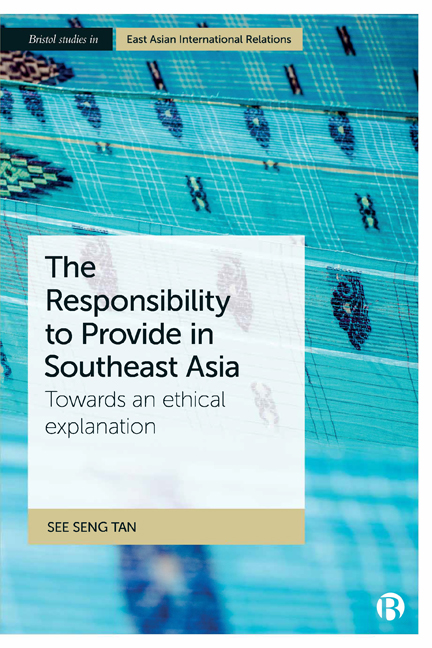Book contents
- Frontmatter
- Dedication
- Contents
- List of Tables
- List of Abbreviations
- Acknowledgements
- 1 Towards an Ethos of Responsibility in Southeast Asia
- 2 The Responsibility to Protect (R2P) and Responses from Southeast Asia
- 3 Towards a ‘Responsibility to Provide’ (R2Provide) in Southeast Asia
- 4 Institutionalizing Security Regionalism: Responsibility as ‘Response Ability’
- 5 Responsible Provision in HADR, Conflict Management and Human Rights
- 6 Towards the Responsible Management of Disputes in Southeast Asia
- 7 Communitarianism, Liberalism and the Limits of Responsibility in Southeast Asia
- 8 Levinas and the Responsibility to Provide in Southeast Asia
- 9 The Responsibility to Provide: Implications for the Region and Beyond
- Notes
- Bibliography
- Index
1 - Towards an Ethos of Responsibility in Southeast Asia
Published online by Cambridge University Press: 02 March 2021
- Frontmatter
- Dedication
- Contents
- List of Tables
- List of Abbreviations
- Acknowledgements
- 1 Towards an Ethos of Responsibility in Southeast Asia
- 2 The Responsibility to Protect (R2P) and Responses from Southeast Asia
- 3 Towards a ‘Responsibility to Provide’ (R2Provide) in Southeast Asia
- 4 Institutionalizing Security Regionalism: Responsibility as ‘Response Ability’
- 5 Responsible Provision in HADR, Conflict Management and Human Rights
- 6 Towards the Responsible Management of Disputes in Southeast Asia
- 7 Communitarianism, Liberalism and the Limits of Responsibility in Southeast Asia
- 8 Levinas and the Responsibility to Provide in Southeast Asia
- 9 The Responsibility to Provide: Implications for the Region and Beyond
- Notes
- Bibliography
- Index
Summary
Introduction
Deeds speak the language of the great virtues far better than words do. Words limp outside the gates of the mystery of compassion for strangers. (Hallie, 1997: 42)
Are Southeast Asians responsible? Are the sovereign states of Southeast Asia responsible actors that care and provide for their own people and societies? Do they hold a sense of obligation towards their neighbours in need within Southeast Asia? Do their foreign policies and neighbourly conduct reflect that sense of obligation and responsibility towards others? These questions are motivated by an incipient ‘ethos’ of intraregional responsibility that appears to be emerging among Southeast Asian countries – in an embryonic and uneven fashion, to be sure, and more evident in some than in others. This ethic or norm has been expressed in terms of acts of hospitality shown to strangers across national boundaries, who may be victims of earthquakes, typhoons and other natural disasters. It has manifested as forms of assistance given – rendered in forms varying from relief aid, financial assistance, military equipment and training, boots on the ground and the like – to neighbours coping with economic difficulties, problems of militancy and terrorism and so on. Arguably, it has also materialized as a mutual readiness by governments to resort to pacific and increasingly rulesbased approaches to manage and, where feasible, resolve their disputes with one another. While ideology could well be a driver behind this sense of responsibility, the story of what I call responsible provision in Southeast Asia suggests a considerably more complex narrative that sees, among other things, illiberal nations engaging in acts of hospitality, sometimes more so than professedly liberal democratic nations, towards their neighbours. On the other hand, strategic intentions and interests have been known to motivate the conduct of states, and Southeast Asian nations are obviously not exceptions. And yet it has neither always and only been due to cunning reason or realpolitik considerations that states, including Southeast Asian countries, do what they do (Jonas, 1996: 188; Peou, 2002/03; Eaton and Stubbs, 2006).
The foregoing considerations raise intriguing questions about the evolving relationship between sovereignty and responsibility in Southeast Asia.
- Type
- Chapter
- Information
- The Responsibility to Provide in Southeast AsiaTowards an Ethical Explanation, pp. 1 - 16Publisher: Bristol University PressPrint publication year: 2019



